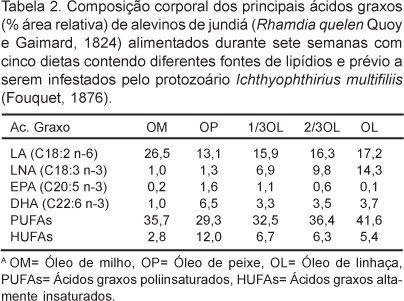A limiting factor in the early stage of the jundiá (Rhamdia quelen Quoy; Gaimard, 1824) culture is the presence of diseases such as ichthyophthiriasis or "Ich". Dietary polyunsaturated fatty acids (PUFAs) have a potent immunomodulatory activity; and this activity depend of the fish species, quantity/quality of the dietary PUFAS. The aim of this study was evaluate the physiologic response ofjundiá, rather fed diets with different sources of fatty acids when challenge to Ich disease. Fingerlings ofjundiá (7.6±0.8g) were fed during seven weeks with five diets with a different lipid source: fish, linseed and corn oils. Then, the fish were challenged with the Ichthyophthirius multifiliis (Fouquet, 1876). On the 5th day, the presence of the disease was detected. Survival rate, blood samples and infection grade were recorded. Diets affect the survival rate of fingerlings, thus fish fed with diet with fish oil showed a higher survival. Hematocrit and infestation grade no recorder differences among treatment. The differential analysis of white blood cells shows difference. The results point out, at first time injundiá, that dietary lipids caused diversity physiologic response, this may be represent an opportunity for the disease treatment. New studies must be carrying out to deep knowledge found.
ichthyophthiriasis; Ichthyophthirius multifiliis; immune response




